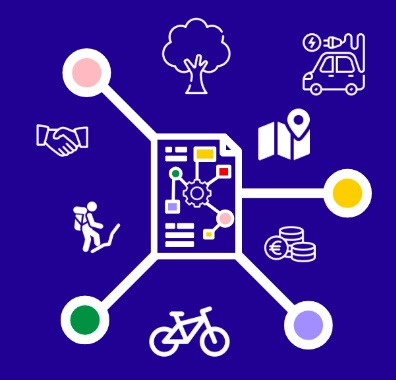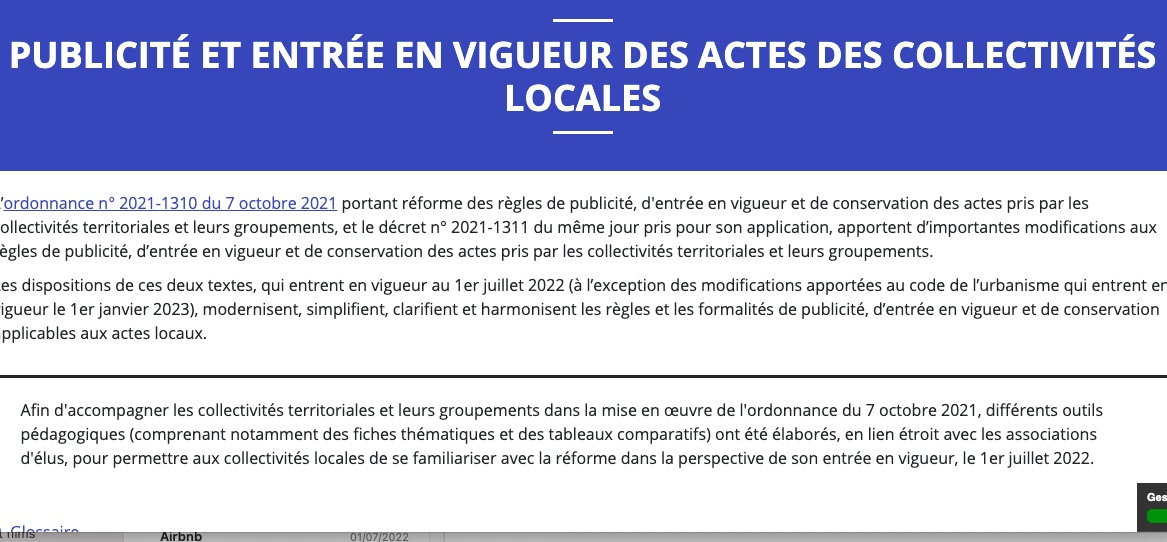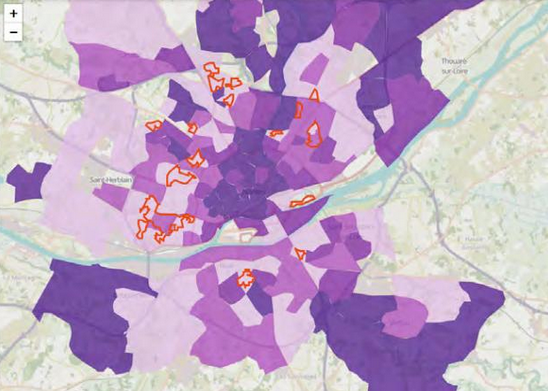Dynamic momentum
Over the past 18 months, several initiatives have been launched to open up public data:
- implementation of ministerial roadmaps on data policy;
- a tracking table now allows you to follow the opening of new public datasets, algorithms, source codes and APIs;
- the redesign of the data.gouv.fr portal;
- the creation of a " datalab " within the Interministerial Digital Department (DINUM), which will help accelerate data projects by providing material, technical, human and legal support;
- the opening of a funding window to co-finance data-related projects in government departments;
- the introduction of a data catalog at Insee, offering a wide range of search and consultation functions.
However, this drive to open up public data also highlights the challenges of discoverability and standardization.
Discoverability: how to easily identify relevant datasets? To facilitate data searches, the Etalab department, which runs the data.gouv.fr platform, is working with data producers to compile as complete a list as possible of existing databases and datasets on certain key themes.
Whether the aim is to simplify access to data in a specific field, around a public policy, or to organize a sectoral ecosystem of data, we are seeing the emergence of platforms and portals that bring together open data around themes such as research data, with the portal Recherche.Data.Gouv.fr, cartography (with the Cartes.gouv.fr project ), the ecological transition, with the Ecosphere(s) project, local information and statistics (with Open Collectivités) or territorial data on the job market (with Data Emploi).
Standardization: the use of open formats is not enough to ensure widespread re-use of data. Data sets must also be standardized. Despite initiatives by the French government (such as schema.gouv.fr), OpenDataFrance(Socle commun des données locales) and the Conseil national de l'information géolocalisée, standardization of open data is far from the norm. Each territory relies on its own specificities and semantics, which hinders interoperability not within systems and infrastructures, but between them.
The European Commission, for its part, is giving new impetus to the opening up of public data, with a regulation that lists the six categories of "data (high-value data sets) " that public-sector players will have to make available free of charge, and specifies how they are to be disseminated.
Références :
France leads Europe in opening up public data
Thecomparative study commissioned by the European Commission on the maturity of open data in the various member states (Open Data Maturity in Europe 2022) puts France in first place (with a maturity score evaluated at 97%).
Countries were assessed on four dimensions: policy and legislation, data portals, impact of openness and data quality. In terms of openness policy, France scored 96%, compared with the European average of 86%.
In terms of data quality, France scored 93%, compared with a European average of 77%. On the basis of its scores in all four dimensions, the report places France (along with eight other countries) in the group of "trendsetters".
Référence :
Data.gouv.fr: 47,000 datasets and 153.4 million resources downloaded
47,000 datasets are available on Data.gouv.fr, the national open data platform, from 4,900 organizations.
Data.gouv.fr recorded 54.2 million visits in one year (between December 2022 and December 2023). The platform's 112,900 users downloaded 153.4 million resources. Data.gouv.fr reports 3.7 million reuses.
Long-awaited data sets have been published for 2022 and 2023:
- Indexes of social position (IPS) in schools, collèges and lycées, which give an idea of pupils' social status based on their parents' professions and social categories(Ministry of National Education and Youth);
- The register of condominiums, which provides technical and legal data on condominiums(Agence nationale de l'habitat);
- The national building database (BDNB), which maps and qualifies existing buildings (residential and tertiary)(Centre scientifique et technique du bâtiment);
- The rent map, which contains indicators of advertised rents at commune level(French Ministry of Ecological Transition);
- Polling stations and voter addresses, by Insee ;
- Aggregated election data;
- "Rent map" - Indicators of advertising rents by municipality in 2023.
From January 1, 2024, Météo-France will make all its public data available free of charge. On this occasion, the thematic platform meteo.data.gouv.fr was also launched, with the aim of creating a platform for referencing, hosting and distributing the public meteorological data produced by Météo-France.
Références :
Who are Data.gouv.fr users?
Data.gouv.fr's user survey provides a snapshot of the current profile of the data.gouv.fr community:
- 26% claim to have advanced data processing skills;
- 38% consider themselves to have an intermediate level;
- 25% identify themselves as novices;
- 7% declare they have no skills at all.
Concerning the use of the platform :
- 60% of respondents visit data.gouv.fr to download and use data;
- 30% to find information quickly (although data.gouv.fr is a platform for raw data, not information);
- 10% to publish data or view activity on their datasets.
Référence :
Redesign of data.gouv.fr
In response to the difficulties encountered by users in finding data when searching, the data.gouv.fr team has undertaken a complete overhaul of the search engine and the search experience in general.
To facilitate data searches, we are working with data producers to compile as complete a list as possible of existing databases and datasets on certain key themes, such as housing, employment and health data.
Référence :
1,062 local authorities committed to opening up public data
Since October 2018, all local authorities with more than 3,500 inhabitants (and 50 full-time equivalent employees) have been obliged to publish their data "by default". This obligation meets the objectives of transparency vis-à-vis citizens, efficient public action and economic development. Five years on, while 40% of local authorities are well aware of this obligation (which carries no penalties), less than 16% comply with it.
However, this percentage is rising. By 2022, 168 new communities had joined the movement.
According to the Observatoire open data des territoires, by 2022, 1,062 local authorities were publishing open data, representing an increase of 19% in one year for all local authorities: all regions, 92% of metropolises, 65% of towns with over 100,000 inhabitants and 64% of départements. But only 10% of communes and EPCIs with fewer than 100,000 inhabitants.
Référence :
60% of the population lives in a municipality or EPCI committed to an open approach.
59% of local authorities publish their data on a portal, and 36% on the Géoportail.
In the most advanced local authorities, the nature of portals is gradually changing. The data download areas of the early days, sometimes arid and not very communicative, are giving way to real editorialized sites. Information and numerous "data visualizations" are organized for citizens (who still have the option of downloading the data). Spaces are reserved for developers or partners wishing to connect in real time to different data sources.
43% of local authorities have opted for open licenses.
The Observatoire open data des territoires provides detailed information on the governance of 171 territorial platforms (shared or dedicated), on the frequency with which published datasets are updated, and on delays in updating data.
Portals and thematic platforms to discover and take advantage of open data
- Recherche Data Gouv: a portal for research data. In July 2022, the French Ministry of Higher Education and Research inaugurated the Recherche Data Gouv portal , an ecosystem for sharing and opening up research data.
- Cartes.gouv.fr: the future public service for territorial maps and data. At Numérique en Commun[s] 2023, held in Bordeaux on October 19 and 20, IGN (Institut national de l'information géographique et forestière) announced the forthcoming launch of the cartes.gouv.fr website. Cartes.gouv.fr will initially contain freely accessible public maps and data on a wide range of themes (topography, ecology, safety, land tenure, regulations, etc.), and will also offer services that will be enhanced to enable everyone to create, host, contribute, share, visualize and publish data and maps independently. Cartes.gouv.fr is based on a new open, collaborative infrastructure, the Géoplateforme. The future public service for territorial maps and data.
- Ecosphère(s) to develop the ecological transition data ecosystem. The French Ministry for Ecological Transition will shortly be opening "Ecospheres", the platform for accessing data produced by the ministerial cluster and implemented by the Ecolab team, within the General Commissariat for Sustainable Development. Ecospheres is designed to respond to the findings of recent studies, which have shown how complex it is to search for data, due in particular to its multiplicity, duplication, numerous tools and lack of updating. Ecosphère(s) takes the form of a thematic data portal designed in the same spirit as transport.data.gouv.fr in the field of mobility. It draws on the infrastructure and tools of data.gouv.fr, enabling data to be sorted, extracted, previewed and quality assessed. The portal does not host the data directly, but "harvests" metadata from open environmental databases held by local authorities, government agencies and operators. It already lists over 27,000 data sets.
- Meteo.data to centralize weather and climate data. The meteo.data.gouv.fr platform centralizes weather and climate data that can be downloaded and used free of charge. It includes climatological data from stations in mainland France and overseas, as well as "climate memory" data, which show the effects of climate change that have already been observed. The platform will gradually be enriched with new data such as observation data measured by weather stations, weather alerts, radar data and numerical weather prediction (NWP) data models.
- Open Collectivités to simplify access to local information and statistics. Statistical information on local authorities is disseminated by numerous players in the institutional sphere. The dissemination of this information makes it difficult for users to see. The diversity of formats - HTML pages, PDF documents, databases - makes it difficult to read. To this end, statisticians from the Direction Générale des Collectivités Locales (DGCL) have developed a portal, Open Collectivité, which centralizes "studies, statistics and local tools useful for decision-making, research or public debate". The Open Collectivité portal is aimed at public officials from local authorities, official statistics departments and central administrations, as well as civil society: citizens, journalists and researchers.
- Data Emploi, a tool for deciphering the labor market in every region. Pôle emploi has launched the Data Emploi portal, which brings together all available, up-to-date labor market monitoring data for the whole of France, employment area by employment area. Using interactive maps, this tool presents a wide range of indicators on the labor market in a given area, such as the dynamics of employment in the region, the sectors that are recruiting the most, the number of jobseekers and the types of contracts signed. This information comes from the Pôle emploi database (which the operator aggregates on a daily basis, in constant liaison with local economic players), as well as from a number of external data sources (INSEE, DARES, etc.).
Références :
How can open data be standardized?
While the law imposes a principle of generalized openness, each government department and territory publishes data according to its skills, data holdings and practices.
"From one producer to another, the files do not necessarily contain the same fields or provide the same level of detail", observes Data Publica in a comprehensive dossier devoted to the standardization of open data. What's more, data is not named in the same way in all regions. In the case of cycleability, for example, you'll have to search alternately for "cycle facilities" or "cycle paths", and you'll rarely find the keyword "cycle" in dataset descriptions, even though the term comes up spontaneously in connection with the subject. Beyond differences in terminology between local authorities, there is a more general mismatch (avocabulary mismatch) between producers, who publish documents using their own vocabulary, and users, who formulate their needs using a different one.
Since 2018, the OpenDataFrance association, which federates local authorities committed to an open data approach, has been developing the Socle Commun des Données Locales (SCDL) to standardize the open data publication of essential data produced by territorial players, helping producers improve the quality of the data they publish. Eight data sets, previously selected as priorities, have been standardized.
The Socle Commun des Données Locales has given impetus to state administration with the June 2019 launch of schema.data.gouv.fr, which references French standards that have been adopted by regulation or designed by the community of data producers and reusers.
Data schemas are used to describe data models: what are the different fields, how are the data represented, what are the possible values, etc.? Among other things, they can be used to validate that a dataset conforms to a schema, generate documentation automatically, generate example datasets or propose standardized input forms.
A number of data schemas have been published in recent months, including the Base Adresse Locale (BAL), DATAtourisme, aid schemes, essential data on French public procurement contracts, and facilities (specification of the data model for a local authority's public community facilities), a data schema for the reparability index, a schema for describing infrastructure work projects, schemas for electric vehicle recharging infrastructures, for hiking routes, carpooling sites and digital mediation sites, etc...
Références :
Linked articles
Open data: why and how to standardize datasets?

Ten years of open public data: open data begins a new phase

Opening up content and data in cultural institutions: where do we stand?

Potential impacts of open data reuse: use cases to discover

Local government acts: online publication becomes the norm from July

Données et quartiers : comment mettre la science des données au service des quartiers prioritaires de la ville ?

Towards improved accessibility of INSEE data





